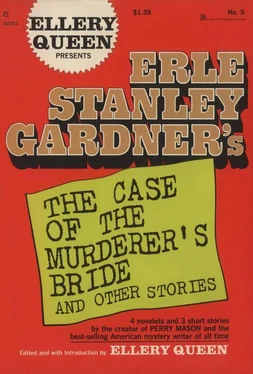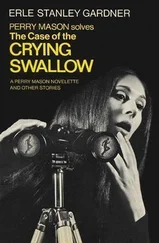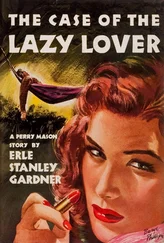Erle Gardner - Erle Stanley Gardner’s The Case of the Murderer’s Bride and Other Stories
Здесь есть возможность читать онлайн «Erle Gardner - Erle Stanley Gardner’s The Case of the Murderer’s Bride and Other Stories» весь текст электронной книги совершенно бесплатно (целиком полную версию без сокращений). В некоторых случаях можно слушать аудио, скачать через торрент в формате fb2 и присутствует краткое содержание. Город: New York, Год выпуска: 1974, Издательство: Davis Publications, Жанр: Классический детектив, на английском языке. Описание произведения, (предисловие) а так же отзывы посетителей доступны на портале библиотеки ЛибКат.
- Название:Erle Stanley Gardner’s The Case of the Murderer’s Bride and Other Stories
- Автор:
- Издательство:Davis Publications
- Жанр:
- Год:1974
- Город:New York
- ISBN:нет данных
- Рейтинг книги:4 / 5. Голосов: 1
-
Избранное:Добавить в избранное
- Отзывы:
-
Ваша оценка:
- 80
- 1
- 2
- 3
- 4
- 5
Erle Stanley Gardner’s The Case of the Murderer’s Bride and Other Stories: краткое содержание, описание и аннотация
Предлагаем к чтению аннотацию, описание, краткое содержание или предисловие (зависит от того, что написал сам автор книги «Erle Stanley Gardner’s The Case of the Murderer’s Bride and Other Stories»). Если вы не нашли необходимую информацию о книге — напишите в комментариях, мы постараемся отыскать её.
Erle Stanley Gardner’s The Case of the Murderer’s Bride and Other Stories — читать онлайн бесплатно полную книгу (весь текст) целиком
Ниже представлен текст книги, разбитый по страницам. Система сохранения места последней прочитанной страницы, позволяет с удобством читать онлайн бесплатно книгу «Erle Stanley Gardner’s The Case of the Murderer’s Bride and Other Stories», без необходимости каждый раз заново искать на чём Вы остановились. Поставьте закладку, и сможете в любой момент перейти на страницу, на которой закончили чтение.
Интервал:
Закладка:
“We’ll try to keep an eye on things,” Dr. Dixon said. “We—”
He broke off as the door of one of the cabins opened and an oblong of bright light pierced the darkness. A figure was silhouetted against the oblong.
“That’s Ives now,” Cortland whispered.
Ives, apparently with something under his left arm, stepped out of the cottage, turned to say something over his shoulder, closed the door, and then, producing a small flashlight, started down the sloping road to the wharf landing.
Dr. Dixon tapped Cortland on the arm. The two followed silently, staying in the shadow of the cliff to the south of the road.
They heard Ives’s steps on the boards of the wharf.
“He’s getting something out of the boat,” Cortland whispered.
“Or putting something in,” Dr. Dixon said. “We’re in a precarious situation here, Ed. He might spot our reflections in the water. Let’s get down and sit close, so we’ll seem to be a shapeless shadow.”
They sat on their heels.
“I’d like to go shake the guy down,” Cortland grumbled.
“We can’t take the chance, Ed — not until we can get a definite identification on that picture. Even then, we’ve got to find out something more about his background before we dare to move in. I wouldn’t make a mistake in this case for worlds. I keep thinking of that look of utter devotion in her eyes! She’s hypnotized. It would be a crime to spoil it.”
They heard vague, muffled sounds from Ives’s boat.
Soon Ives’s feet pounded back along the wooden wharf, crunched on the gravel of the road, and then they saw him walking slowly back up the hill to his cabin. He seemed to be carrying something in his right hand.
Dr. Dixon and Corporal Cortland fell in behind so they could see his silhouette against the light from the cabin grounds.
Midway to the cabins, Ives stopped at the garbage-disposal barrel and tossed something in. Then he walked on to the cabin door. A moment later he was flooded with light from the interior of the cabin. The watchers saw a pair of arms circle his neck. Ives stepped inside, the door was closed, and it was dark once more.
“Now what the hell!” Cortland said. “He went down to the boat for some purpose. Do you suppose he’s suspicious of us and went down to see if we’d been examining the boat?”
Dr. Dixon shook his head. “He didn’t even look back when he went down to the boat or when he returned to the cabin. He isn’t suspicious — unless, of course, he’s very suspicious and is laying a trap for us. The first thing we must do is to see what he tossed into that barrel.”
They waited a half hour, then Corporal Cortland led the way to the disposal barrel and played his flashlight on the contents.
The big metal drum was three-quarters’ full: empty tin cans, cardboard cartons, a pair of discarded tennis shoes.
“It must have been the tennis shoes,” Cortland said.
Dr. Dixon leaned over to study the barrel carefully.
“It has to be on top, Ed,” he said. “He didn’t bend over the barrel, as would have been necessary if he had shoved anything down. He just dropped something in. Moreover, if he had moved anything, these empty cans would have made a clatter.”
“It has to be the tennis shoes,” Cortland decided.
“Let’s take an inventory,” Dr. Dixon said. “There are a pork-and-bean can, a cereal carton, two dishwashing detergent boxes, a tomato-juice can; here are two empty sardine cans, a newspaper, the tennis shoes, a pair of badly bedraggled socks and... wait a minute, what’s this? Here’s a pair of pliers with one of the jaws broken off.”
“It must have been the tennis shoes,” Cortland said.
He picked them up. The shoes had been badly worn down to the point where the sole on the right shoe had a circle which had worn almost through.
“A tennis player,” Cortland said. “He pivots on his right foot when he serves. Notice how the right shoe is worn more than the left.”
Dr. Dixon remained thoughtfully silent.
“Not convinced?” Cortland asked.
“I don’t want to jump to conclusions,” Dr. Dixon said. “Let’s go take a look inside that boat.”
“Do you suppose he could have planted a bomb in the boat, one that’s due to explode tomorrow sometime?”
“Anything’s possible,” Dr. Dixon said, “but we’ve got to have evidence before we make any move.”
They searched the boat thoroughly. It contained a paddle, an anchor attached to 50 feet of new rope, a spare gasoline tank for the motor, and two kapok-filled cushions which could be used as life preservers in an emergency. There were no fishing rods, no bait boxes, nothing to indicate that the boat had ever been used except for hunting rocks. There was, however, a new icepick. There was no sign of anything that could have been used to conceal a bomb.
“He didn’t put anything in the boat,” Ed said at length. “He took something out.”
“He had something with him when he went down to the boat,” Dr. Dixon pointed out.
“The tennis shoes, Doctor?”
“Why should he take the tennis shoes down to the boat, stay in the boat a while, then turn around, bring the same tennis shoes back, and throw them away?”
“How do we know they’re the same tennis shoes?” Cortland asked. “Suppose he bought a new pair of tennis shoes. He had left his old ones in the boat. He went down to the boat, put on his new tennis shoes, picked up the old tennis shoes, took them back and threw them away.”
“Then these old tennis shoes had been left in the boat?” Dr. Dixon asked.
“Yes.”
“He walked down to the boat carrying new tennis shoes with him, put on the new tennis shoes down here, and took the old tennis shoes back. That still leaves an extra pair of shoes. What happened to the shoes he was wearing when he walked down to the boat?”
Cortland thought that over. “I guess I’m getting ahead of myself, Doc,” he admitted. “But I still think the tennis shoes are the key to the whole thing. Let’s go back to the cabin and get to bed. We can’t do any more here.”
It was four o’clock in the morning when Nan Ives suddenly awoke. She lay still, her heart beating rapidly as though she had been startled. Then, as she felt the secure warmth of Larry’s arms around her, she relaxed and sighed happily.
“Let’s get up, darling,” Larry whispered.
She turned toward him.
“Now? It’s so early.”
“It’s wonderful out. The stars are blazing. It will be light by the time we get the boat going, and we can see the dawn out on the lake.”
She smiled. “Just as you say, dearest,” she said and kissed him.
While they were dressing she said, “What about breakfast?”
“That,” he said, “is the nice part of it. We’ll go down to Cottonwood Cove for breakfast. The scenery is beautiful on the way down there and they have a nice little restaurant with good cooking. You’ll love it.”
Fifteen minutes later, arm in arm, they were walking down the sloping roadway toward the water.
The east was beginning to show light. Already a slight tinge of color brightened the sky. Overhead and to the west, however, the stars were steady, blazing, and brilliant; the air was warm and balmy. The water was like a sheet of glass, reflecting the eastern sky, the stars, and the dark outlines of the mountains which bordered the lake.
Larry helped his wife into the boat, saw that she was comfortably ensconced on a seat cushion, and, having untied the boat, pushed off into the warm half-darkness.
Dr. Herbert Dixon, awakening early, showered, dressed, and returned to the bedroom where Corporal Ed Cortland was sleeping soundly.
The criminologist stood over Cortland with a wet washcloth in his hand and squeezed a single drop of cold water on Cortland’s forehead.
Читать дальшеИнтервал:
Закладка:
Похожие книги на «Erle Stanley Gardner’s The Case of the Murderer’s Bride and Other Stories»
Представляем Вашему вниманию похожие книги на «Erle Stanley Gardner’s The Case of the Murderer’s Bride and Other Stories» списком для выбора. Мы отобрали схожую по названию и смыслу литературу в надежде предоставить читателям больше вариантов отыскать новые, интересные, ещё непрочитанные произведения.
Обсуждение, отзывы о книге «Erle Stanley Gardner’s The Case of the Murderer’s Bride and Other Stories» и просто собственные мнения читателей. Оставьте ваши комментарии, напишите, что Вы думаете о произведении, его смысле или главных героях. Укажите что конкретно понравилось, а что нет, и почему Вы так считаете.












